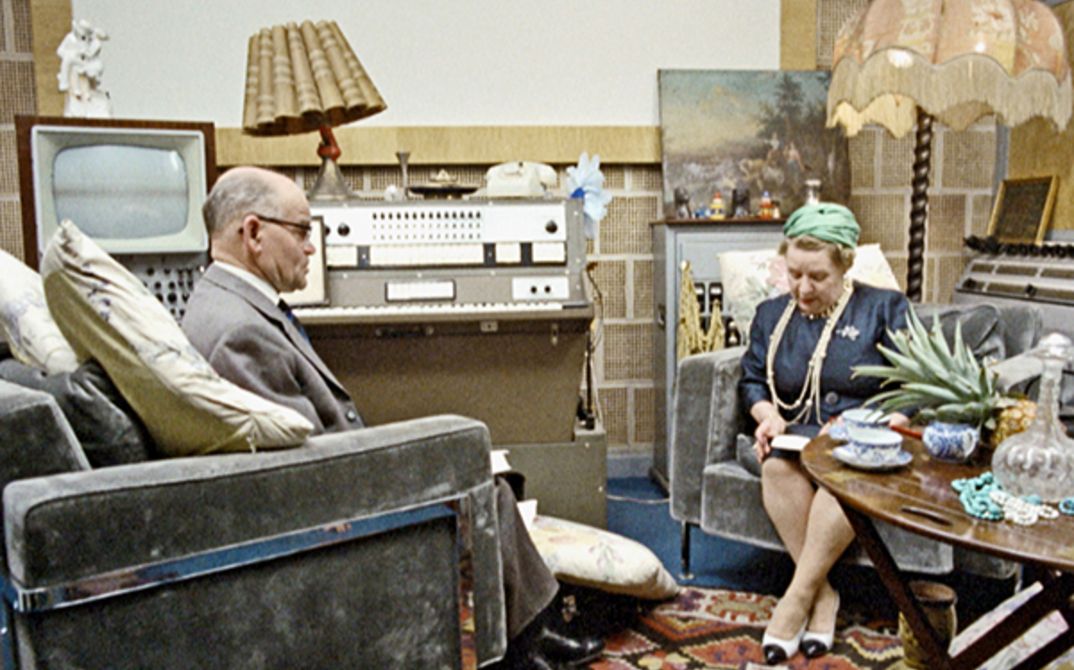The situation in 2034
The film DER GROSSE VERHAU takes place after the destruction of the earth. Seven galactic revolutions have failed, six space wars were lost. Nonetheless, the situation does not resemble that in George Orwell’s “1984”. The world monopolist, the Suez Canal Company, does not make its profits from the dead paper material of stocks, but from living labour, especially that of the small-scale entrepreneurs who ply outer space.
It is these minor businesses who drive development forward through their fervent belief in the exploitation possibilities of outer space.
They live by the motto, “Everything will be over in two years.” They live forever by this motto. (…)
The theme of the film is the contradiction between the immense vastness and great wealth of the universe and the particular narrowness of the forms of exploitation in which people have to live-
One wonders why people – especially the residents of the galactic imperial capital, who sit in their bunkers – continue to play along. Some have already lost hope. Others, however, still hope to snag some of the wealth for themselves. (...) (Alexander Kluge)
Two Bavarians in space. Conversation with Alexander Kluge
Florian Hopf: What is DER GROSSE VERHAU all about?
It is about the adventures of small-scale entrepreneurs in outer space at a time when the grand monopoly rules absolutely. It is therefore about a societal situation.
What does this society look like?
It is an exploitation society. The workers who have become small-scale entrepreneurs are the pioneers who keep driving the development of the monopolies. They work like dogs. If they are successful, they are bought up. They themselves bear the risks for the many failures that precede success. Therefore, whatever happens, they always lose.
What experiences is your film based on?
I have no more experience with the technology of the year 2034 than Wernher von Braun. But I can develop a model of society. The model need not exist in 2034. There might be very different developments, for example those predicted by Mao Zedong. But if the “late industrial society” does still exist then, it will be confronted with the increasing contradiction between small-scale entrepreneurs and highly organised monopolies, i.e. we ourselves have experience of this society.
The monopolies will function as a “human licensing society”?
Just like GEMA (Germany’s ASCAP-like copyright administering organisation) manages sounds. Of course, the creative elements, the concrete people elude this forced administration. That is, real life continues underneath the law dictated by business. That world history repeats itself again and again is only an impression. In reality, it is constantly changing underground. The external image is paradoxical: once the world monopoly is formed (under anarchic conditions of production), the result is not order but civil war (see also Brecht’s “Refugee Conversations”).
But these processes can’t actually be seen.
Our sensory experience is always that of an individual person. But we are guided, or let ourselves be guided, by the experience that is a collective product of all people. For that, there is no eye, except for the societal gaze. Only it can grasp the whole of society and assess what is essential and determines our fate. Mediating between direct sensory experience, which is our only experience, and societal experience, which is the thing that we need, is the actual current theme of today’s aesthetic production, which can be described as organised human experience. (...)
Why is there war in DER GROSSE VERHAU, and where does the enemy come from?
The flipside to total control is civil war. It’s a societal law that sounds dogmatic when you first hear it. But it contains more experience than George Orwell’s “1984”, which pretends that Big Brother could completely control the masses and at the same time maintain a differentiated industrial process. In reality, this industrial process produces so much societal wealth, so many ways out, so much spirit of defiance, that the attempt at total control leads to an explosion. This does not mean that control is not repeatedly attempted. The counter-reaction of concrete, living interests is opposition. This opposition is repressed with weapons. The answer is an armed present, i.e. civil war. The repression of interests on an industrial level brings civil war. Since the system cannot really distinguish friend from foe, it turns parts of itself into an opponent. In this inescapable situation, there is no external enemy that one simply has to defeat. Rather, human society fights against its own image.
So your film is less about a story than about situations?
A jungle gym on a children’s playground also has no plot , but it’s an opportunity for physical exercise. One could use the film in such a way that imagination can move inside it and one’s own experience can be recognised in the situations. And a science fiction film allows for this without being burdened by the limits imposed by our planet’s reality. That’s why the film does not call on viewers to take sides, to decide, or to make a moral judgment – actually, as a viewer, one can’t really do that at all – but to use the film in order to enrich their own experience.
(Infoblatt No. 12, 1. Internationales Forum des jungen Films, Berlin 1971)
